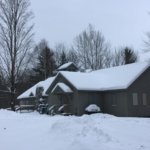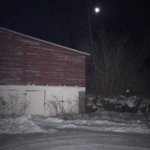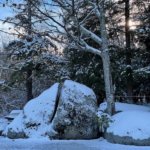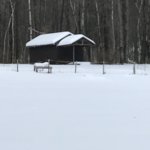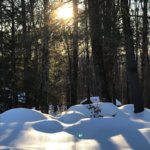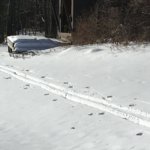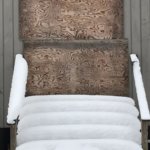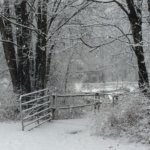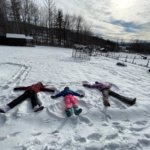Sing:
Hark the Vesper bell is pealing,
O’er the meadow soft and green.
Nearer now and nearer stealing,
Soft it breaks upon my ear.
Jubilate, jubilate, jubilate, Amen. Jubilate, jubilate, jubilate, Amen.
First Words: February. The month is infused with love and learning—Valentine’s Day energy and Black History month, all wrapped up, here on the edge of camp, with the full-on beauty of winter snow. It is a very good month, indeed, worth celebrating, even as the March thaw sets in. (Although today in New England we have cold and wind today. “March comes in like a Lion”) Jubilate, jubilate, jubilate, over and over again!
Sing: “Caledonia”—a favorite camp love song, originally by Dougie MacLean, modified for camp by us!
I don’t know if you can see
the changes that have come over me,
these last few days I’ve been afraid
that I might slip away.
I’ve been telling old stories, singing songs
that make me think about where I came from.
That’s the reason why I seem so far away today.
Chorus:
Let me tell you that I love you,
that I think about you all the time.
Caledonia you’re calling me,
and now I’m going home.
If I should become a stranger,
you know that would make me more than sad.
Caledonia’s been everything I’ve ever had.
Now I have moved and I’ve kept on moving,
Proved the points that needed proving,
lost the friends that needed losing,
found others on the way.
I have kissed the lovers and left them sighing,
stolen dreams, yes there’s no denying.
Traveled hard sometimes with coat tails flying,
somewhere in the wind.
Chorus
Now I’m sitting here before the fire,
the empty rooms, the chorus choir.
The flames of truth don’t get any higher
they’ve withered now they’ve gone.
I’m steady thinking my way is clear
and I know what I will do tomorrow,
when the hands are shaken , the kisses flow
then I will disappear.
Chorus
Poem for Valentine’s Day: “Touched by an Angel”, by Maya Angelou
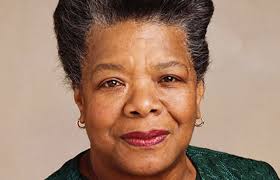
We, unaccustomed to courage
exiles from delight
live coiled in shells of loneliness
until love leaves its high holy temple
and comes into our sight
to liberate us into life.
Love arrives
and in its train come ecstasies
old memories of pleasure
ancient histories of pain.
Yet if we are bold,
love strikes away the chains of fear
from our souls.
We are weaned from our timidity
In the flush of love’s light
we dare be brave
And suddenly we see
that love costs all we are
and will ever be.
Yet it is only love
which sets us free.
Sing: ” Give yourself to Love”, by Kate Wolf
Kind friends all gather ‘round, there’s something I would say.
What brings us together here has blessed us all today.
Love has made a circle that holds us all inside.
Where strangers are as family, and loneliness can’t hide.
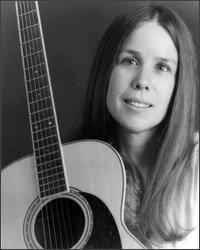 Chorus:
Chorus:
So give yourself to love, if love is what you’re after.
Open up your heart to tears and laughter.
Yes, and give yourself to love, give yourself to love.
I’ve walked these mountains in the rain, I’ve learned to love the wind.
I’ve been up before the sunrise, to watch the day begin.
I always knew I’d find you, but I never did know how.
But like sunshine on a cloudy day, you stand before me now.
Chorus
Love is born in fire, it’s planted like a seed.
Love can’t give you everything, but it gives you what you need.
Love comes when you’re ready, love comes when you’re afraid.
It will be your greatest teacher, the best friend you have made.
Chorus
Story: ” Show Way”, by Jacqueline Woodson
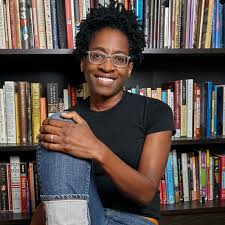 Jacqueline Woodson is a distinguished author mostly of books for children and young adults. She served as the Young People’s Poet Laureate from 2015 to 2017 . Show Way was written in 2006 and is a powerful testament to the strength and resilience of African Americans. It chronicles the story of Jacqueline Woodson’s family from their years enslaved in the American South through to the present. The story mixes tragedy and pain with love, support and hope. The Underground Railroad, that had a number of stops in Vermont, figures into the story powerfully. This story is a camp favorite, known by many BC community members.
Jacqueline Woodson is a distinguished author mostly of books for children and young adults. She served as the Young People’s Poet Laureate from 2015 to 2017 . Show Way was written in 2006 and is a powerful testament to the strength and resilience of African Americans. It chronicles the story of Jacqueline Woodson’s family from their years enslaved in the American South through to the present. The story mixes tragedy and pain with love, support and hope. The Underground Railroad, that had a number of stops in Vermont, figures into the story powerfully. This story is a camp favorite, known by many BC community members.
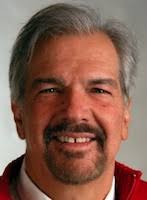
The illustrations, by Hudson Talbott, are excellent. Get to your library or bookstore and have a look!
When Soonie’s Great-Grandma was seven, she was sold from the Virginia land to a plantation in South Carolina without her ma or pa but with some muslin her ma had given her. And two needles she got from the big house—and thread dyed bright red with berries from the chokeberry tree.
In South Carolina, Big Mama raised Soonie’s great-grandma. Raised most the slave children on that large patch of land.
At night, Big Mama told the children stories. Stories she’d tell in a whisper about children growing up and getting themselves free. And the children leaned in. And listened real hard.
And in the daytime when there was some few minutes for a slave to rest a bit Big Mama taught Soonie’s great-grandma to sew colored thread into stars and moons and roads that slave children grew up and followed late in the night, a piece of quilt and the true moon leading them.
Years passed. Big Mama moved on to the next world. And Soonie’s great-grandma grew up, jumped broom with a young man named Ensler. Had herself a baby girl and named that child Mathis May. Loved that baby up so. Yes, she loved that baby up. And one day Mathis May would be Soonie’s grandma, but not for a long, long time yet. In the meantime, she learned to sew. Beautiful girl-child learned to sew.
When Mathis May was seven, she got sold away. Took a star from her mama’s blanket, took a little
piece of the road. Pressed it to her face when she wanted to remember back home. Held it to her heart to feel back home. Got herself a piece of muslin and some thread somewhere and kept up her sewing. Sewed so fine, she was making clothes for everyone in the big house and slaves, too.
And at night, she sewed stars and moons and roads—tiny patch pieces of stars and moons and roads. Slaves whispered what no one was allowed to say: ‘That Mathis know how to make…..
……a Show Way’. Came to her when they needed to talk; came to her for the stories of brave people; came to her for the patch pieces just before they disappeared into the night.
But Mathis May stayed on, grew tall and straight-boned, jumped broom with another slave.
That slave was killed running off to the north side of the war months before he got to meet his baby, a girl-child who was born free that same year, 1863. History went and lost her name…..
Years later—Soonie came. Soonie’s mama held her up in the moonlit night. Showed her the stars, the moon, whispered into her ear, ‘There’s a road, girl. There’s a road.’ Loved that Soonie up so. Yes, she loved that Soonie up.
Soonie and her mama stayed on the land they’d always known, picking cotton for a little pay and a piece of that ground to farm. Called the land ‘Home’. Stayed on with other people—none of them slaves anymore. Hard work making a life—from pink day to blue-black night—but it was a free life just the same. And when the day was finally over, wasn’t hard to find a thing or two to smile about. At night, they cut and sewed. Strange lines and odd designs. People said about Soonie, ‘That child could find sow beauty in so many things.’
When Soonie was seven, she was tall and straight-boned like her mama, took in wash with her mama. Sewed stars on patch pieces. Sewed stars and moons and roads; sewed fields and rivers and trees. Patched the pieces together for her mama to sell come market day. Called those quilts ‘Trail to the North’. Called the quilts ‘Show Way’. Didn’t much need that secret trail to the North anymore, but started living well off the money those quilts brought in.
Sewed those quilts to live. Sewed those quilts to remember. And though some could book read, most could not. Stars and moon and roads. Picture reading was what they’d always known. Some mornings, Soonie looked out over the fields of cotton and dreamed of a place to call her own. Married a man named Walter Scott, who owned a bit of land in Anderson, South Carolina. Had herself a baby girl, named that girl-child Georgiana. Loved that baby up so. Yes, they loved that baby up.
Georgiana who grew tall and straight-boned and free, picking out words from her mama’s Bible by three. Reading by oil-lamp light at age five. People say about Georgiana, ‘She always had a book in her hand.’ Grew up to teach at a small school in Anderson.
Had herself two girls at once, named them Caroline and Ann. Loved those babies up so. Yes, they loved those babies up.
And Caroline and Ann grew up tall and straight-boned, turned seven, walking in a line to change the
laws that kept black people and white people living separate.
They were a little bit scared sometimes, but pinned inside their dresses were Show Way patches Granma Soonie had given them. And something about those patches made ‘Scared’ hang his mean old head and walk away.
Ann grew up writing poems. And sometimes she made the poems into songs. Caroline stitched those songs into art that people bought to hang up on their walls. Ann had me. And mama loved this baby up so. Yes, she loved this baby up.
And when I was seven I didn’t have to work in a field or walk in any freedom lines. But I still read like Georgiana and wrote like Ann, and when the words were slow in coming, I sewed stars and moons and roads into quilts and curtains and clothes because Mama said, ‘All the stuff that happened before you were born is your own kind of Show Way. There’s a road, girl,’ my Mama said, ‘There’s a road’.
And I grew up tall and straight-boned, writing every day. And the words became books that told the stories of many people’s Show Ways.
Had a baby and named that child Toshi Georgiana. Loved that Toshi up so, Yes, I loved that Toshi up. So some mornings, I start all over. Holding tight to little Toshi I whisper a story that came before her……’Now, Soonie was your great-great-grandma, And when Soonie’s great-grandma was seven……”
Sing: “Up above my head”, a spiritual- call and response
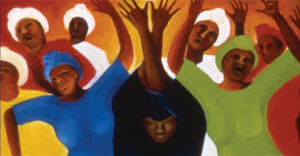
Up above my head, Up above my head,
I hear clapping in the air. I hear clapping in the air.
Up above my head, Up above my head.
I hear clapping in the air. I hear clapping in the air.
Up above my head. Up above my head,
I hear clapping in the air. I hear clapping in the air.
And I really do believe, And I really do believe,
There’s a heaven up there. There’s a heaven up there.
Up above my head, up above my head.
I hear snapping in the air, I hear snapping in the air.
Up above my head, up above my head,
I hear snapping in the air, I hear snapping in the air.
Up above my head, up above my head,
I hear snapping in the air, I hear snapping in the air.
And I really do believe, and I really do believe,
There’s a heaven up there, there’s a heaven up there.
Up above my head, up above my head.
I hear whispering in the air, I hear whispering in the air.
Up above my head, up above my head.
I hear whispering in the air, I hear whispering in the air.
Up above my head, up above my head.
I hear whispering in the air, I hear whispering in the air.
And I really do believe, and I really do believe,
There’s a heaven up there, there’s a heaven up there.
Repeat verse 1 vigorously!
Valentine’s Day Camp Photo Gallery: See if you can identify these February camp images of places we all love! Could you do it if you were sitting with your camp friends? For sure!
Some Learning for us all: As we being March 2021, think of all the connections you could make between February, a month infused with thoughts of love (Valentine’s Day energy!) and thoughts about the steep learning curve all of us are on in terms of what we know about Black History. For people in the Betsey Cox community, we can consider the love we have for this unique and special corner of Vermont and realize that, right here and right now, and especially as we gather at camp, we can learn a lot about the history of African Americans who settled in Vermont, who continue to settle in Vermont and whose stories should be known.
Some of you may know that there’s an African-American Heritage Trail here in Vermont. There are 21 sites on the A-AHT, only a few of which we have explored together. This summer, we hope to add to that list! https://www.vermontvacation.com/stay-and-play/trip-ideas/african-american-heritage-trail
In 2019, a group of BC campers and staff traveled up the road to visit The Clemmons Family Farm in Charlotte. (https://www.clemmonsfamilyfarm.org/) The Farm is a stop on the Heritage Trail. It sits on 148 acres of land and is one of the 4% of farms in the US that remain African-American owned. Jackson and Lydia Clemmons bought their farm in 1962. By then, and since the 1920s, African-Americans had lost 93% of their land assets, going from ownership of 44 million acres to owning just 3.5 million acres across our country. The Clemmons intended to make sure they would hold their land safe for the future. In the 60s, Jackson was a doctor and Lydia was a nurse at the UVM medical center. They raised their children and kept the farm active in a number of very creative ways. Now, their daughter, Lydia Clemmons, continues to develop the Farm for the future. She is a driving force for the Farm’s three-part mission: to preserve the farm as an educational institution, to empower a growing network of Vermont’s Black artists and “culture bearers”, and to build a loving multicultural community around African-American/African history, arts and culture. Lydia Clemmons and her staff are making a difference by creating the Clemmons Family Farm museum and cultural center. Her imagination has turned into action!
Further back in time, Daisy Turner made her mark here in Vermont. Her father, Alexander Turner, escaped from his plantation right at the start of the American Civil War. At the end of the war, he set up a homestead in Grafton, Vermont where he and his wife, Sally, raised 16 children! Two cabins worth of kids! Daisy herself had 13 children. They must have helped their mother throughout her life as she lived until the ripe old age of 104! Daisy became well known as a story teller, and she had many stories to tell given her family’s story, many of which she recorded for the Vermont Folk Life Center. She was featured reciting Civil War poetry in Ken Burns’ PBS documentary on the Civil War. At camp we could take a trip to Grafton where there is a mostly biking trail that we could walk and explore called the Daisy Turner Loop.
Recently, another noted Vermont African-American made the news in Middlebury. He was Alexander Twilight. Born in Bradford, Vermont in 1795, he was allegedly the first African-American man known to have earned a Bachelor’s Degree from an American college or university. He graduated from Middlebury College in 1823. He was elected to the Vermont State legislature in 1836, the only African-American elected to a state legislature before the Civil War. His name is now on one of Middlebury College’s classroom buildings, a well-deserved reminder to everyone of this remarkable Vermonter.
Finally, over the past two years, right down the road from camp in Rutland, Vermont, a sculpture trail has been developed. Two of the statues honor Vermont African-Americans. First to be completed, in Vermont marble of course, is a piece honoring the Vermont Volunteers who served in the 54th Massachusetts Infantry Regiment, an African-American unit during the Civil War. The second one honors Martin Freeman, the first African-American President of a college or university. Freeman graduated at the top of his Middlebury College class in 1849. His father fought in the American Revolution. At the time, slaves could allegedly earn their freedom by fighting for the Americans. In 1856 he became President of the all-Black Allegheny Institute and Mission Church near Pittsburgh, Pennsylvania, later named Avery College. Born in Rutland, it is fitting that this statue, carved by Al Wakefield, an African-American artist, has a place on Rutland’s sculpture trail. It is interesting that Middlebury College’s decision to enroll African-American students way back in the 18th century was the result of Abolitionists living in Middlebury who urged the college to enroll Black students as a demonstration that the school was serious about its stand against slavery.
All of us should consider ourselves on a steep learning curve about Black History, and not just in February, of course, and not just in Vermont. But here in Vermont, where the state was the first to abolish slavery in 1777, there is still much we can learn and a lot of action we can take to know and do more in the interests of social justice and equity. We are at a time in our country where action is both required and available. Good thing we can think about our parts in this work when we are together at camp!
Sing: “Hearth and Fire”, by Gordon Bok
Hearth and fire be ours tonight and all the dark outside.
Fair the night and kind on you, wherever you may bide.
And I’d be the sun upon your head, the wind about your face.
My love, upon the path you tread, and upon your wanderings, peace.
Song and light be ours tonight and all the cold outside.
Peace and warmth be yours tonight, wherever you may bide.
And I’d be the sun upon your head, the wind about your face.
My love upon the path you tread and upon your wanderings, peace.
Hearth and fire be ours tonight and the wind in the birches bare.
O that the wind we hear tonight will find you well and fair.
And I’d be the sun upon your head, the wind about your face.
My love upon the path you tread and upon your wanderings peace.
Final Words:
“What’s the world for you if you can’t make it up the way you want it?” —Toni Morrison

Silence
Jubilate, jubilate, jubilate, Amen. Jubilate, jubilate, jubilate, Amen.

